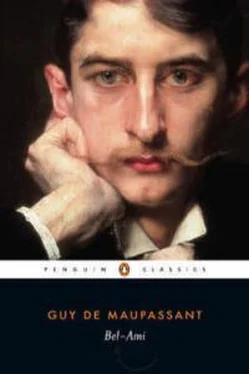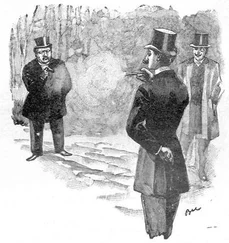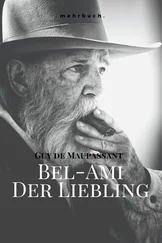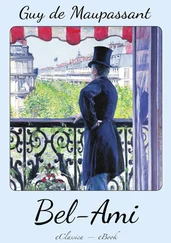"M. Duroy of 'La Vie Francaise' gives us the lie! In doing so, he lies. He owns, however, that a woman named Aubert exists, and that she was taken before a magistrate by an agent. Two words only remain to be added to the word 'agent,' which are 'of morals' and all is told. But the consciences of certain journalists are on a par with their talents."
"I sign myself, Louis Langremont."
Georges's heart throbbed violently, and he returned home in order to dress himself. He had been insulted and in such a manner that it was impossible to hesitate. Why had he been insulted? For nothing! On account of an old woman who had quarreled with her butcher.
He dressed hastily and repaired to M. Walter's house, although it was scarcely eight o'clock. M. Walter was reading "La Plume."
"Well," he said gravely, on perceiving Duroy, "you cannot let that pass." The young man did not reply.
The manager continued: "Go at once in search of Rival, who will look after your interests."
Duroy stammered several vague words and set out for Rival's house. Jacques was still in bed, but he rose when the bell rang, and having read the insulting paragraph, said: "Whom would you like to have besides me?"
"I do not know."
"Boisrenard?"
"Yes."
"Are you a good swordsman?"
"No."
"A good shot?"
"I have used a pistol a good deal."
"Good! Come and exercise while I attend to everything. Wait a moment."
He entered his dressing–room and soon reappeared, washed, shaven, and presentable.
"Come with me," said he. He lived on the ground floor, and he led Duroy into a cellar converted into a room for the practice of fencing and shooting. He produced a pair of pistols and began to give his orders as briefly as if they were on the dueling ground. He was well satisfied with Duroy's use of the weapons, and told him to remain there and practice until noon, when he would return to take him to lunch and tell him the result of his mission. Left to his own devices, Duroy aimed at the target several times and then sat down to reflect.
Such affairs were abominable anyway! What would a respectable man gain by risking his life? And he recalled Norbert de Varenne's remarks, made to him a short while before. "He was right!" he declared aloud. It was gloomy in that cellar, as gloomy as in a tomb. What o'clock was it? The time dragged slowly on. Suddenly he heard footsteps, voices, and Jacques Rival reappeared accompanied by Boisrenard. The former cried on perceiving Duroy: "All is settled!"
Duroy thought the matter had terminated with a letter of apology; his heart gave a bound and he stammered: "Ah—thank you!"
Rival continued: "M. Langremont has accepted every condition. Twenty–five paces, fire when the pistol is leveled and the order given." Then he added: "Now let us lunch; it is past twelve o'clock."
They repaired to a neighboring restaurant. Duroy was silent. He ate that they might not think he was frightened, and went in the afternoon with Boisrenard to the office, where he worked in an absent, mechanical manner. Before leaving, Jacques Rival shook hands with him and warned him that he and Boisrenard would call for him in a carriage the next morning at seven o'clock to repair to the wood at Vesinet, where the meeting was to take place.
All had been settled without his saying a word, giving his opinion, accepting or refusing, with such rapidity that his brain whirled and he scarcely knew what was taking place. He returned home about nine o'clock in the evening after having dined with Boisrenard, who had not left him all day. When he was alone, he paced the floor; he was too confused to think. One thought alone filled his mind and that was: a duel to–morrow! He sat down and began to meditate. He had thrown upon his table his adversary's card brought him by Rival. He read it for the twentieth time that day:
"Louis LANGREMONT,
176 Rue Montmartre."
Nothing more! Who was the man? How old was he? How tall? How did he look? How odious that a total stranger should without rhyme or reason, out of pure caprice, annoy him thus on account of an old, woman's quarrel with her butcher! He said aloud: "The brute!" and glared angrily at the card.
He began to feel nervous; the sound of his voice made him start; he drank a glass of water and laid down. He turned from his right side to his left uneasily. He was thirsty; he rose, he felt restless.
"Am I afraid?" he asked himself.
Why did his heart palpitate so wildly at the slightest sound? He began to reason philosophically on the possibility of being afraid. No, certainly he was not, since he was ready to fight. Still he felt so deeply moved that he wondered if one could be afraid in spite of oneself. What would happen if that state of things should exist? If he should tremble or lose his presence of mind? He lighted his candle and looked in the glass; he scarcely recognized his own face, it was so changed.
Suddenly he thought: "To–morrow at this time I may be dead." He turned to his couch and saw himself stretched lifeless upon it. He hastened to the window and opened it; but the night air was so chilly that he closed it, lighted a fire, and began to pace the floor once more, saying mechanically: "I must be more composed. I will write to my parents, in case of accident." He took a sheet of paper and after several attempts began:
"My dear father and mother:"
"At daybreak I am going to fight a duel, and as something might happen—"
He could write no more, he rose with a shudder. It seemed to him that notwithstanding his efforts, he would not have the strength necessary to face the meeting. He wondered if his adversary had ever fought before; if he were known? He had never heard his name. However, if he had not been a remarkable shot, he would not have accepted that dangerous weapon without hesitation. He ground his teeth to prevent his crying aloud. Suddenly he remembered that he had a bottle of brandy; he fetched it from the cupboard and soon emptied it. Now he felt his blood course more warmly through his veins. "I have found a means," said he.
Day broke. He began to dress; when his heart failed him, he took more brandy. At length there was a knock at the door. His friends had come; they were wrapped in furs. After shaking hands, Rival said: "It is as cold as Siberia. Is all well?"
"Yes."
"Are you calm?"
"Very calm."
"Have you eaten and drunk something?"
"I do not need anything."
They descended the stairs. A gentleman was seated in the carriage. Rival said: "Dr. Le Brument." Duroy shook hands with him and stammered: "Thank you," as he entered the carriage. Jacques Rival and Boisrenard followed him, and the coachman drove off. He knew where to go.
The conversation flagged, although the doctor related a number of anecdotes. Rival alone replied to him. Duroy tried to appear self–possessed, but he was haunted continually by the fear of showing his feelings or of losing his self–possession. Rival addressed him, saying: "I took the pistols to Gastine Renette. He loaded them. The box is sealed."
Duroy replied mechanically: "Thank you."
Then Rival proceeded to give him minute directions, that he might make no mistakes. Duroy repeated those directions as children learn their lessons in order to impress them upon his memory. As he muttered the phrases over and over, he almost prayed that some accident might happen to the carriage; if he could only break his leg!
At the end of a glade he saw a carriage standing and four gentlemen stamping their feet in order to keep them warm, and he was obliged to gasp in order to get breath. Rival and Boisrenard alighted first, then the doctor and the combatant.
Rival took the box of pistols, and with Boisrenard approached the two strangers, who were advancing toward them. Duroy saw them greet one another ceremoniously, then walk through the glade together as they counted the paces.
Читать дальше











